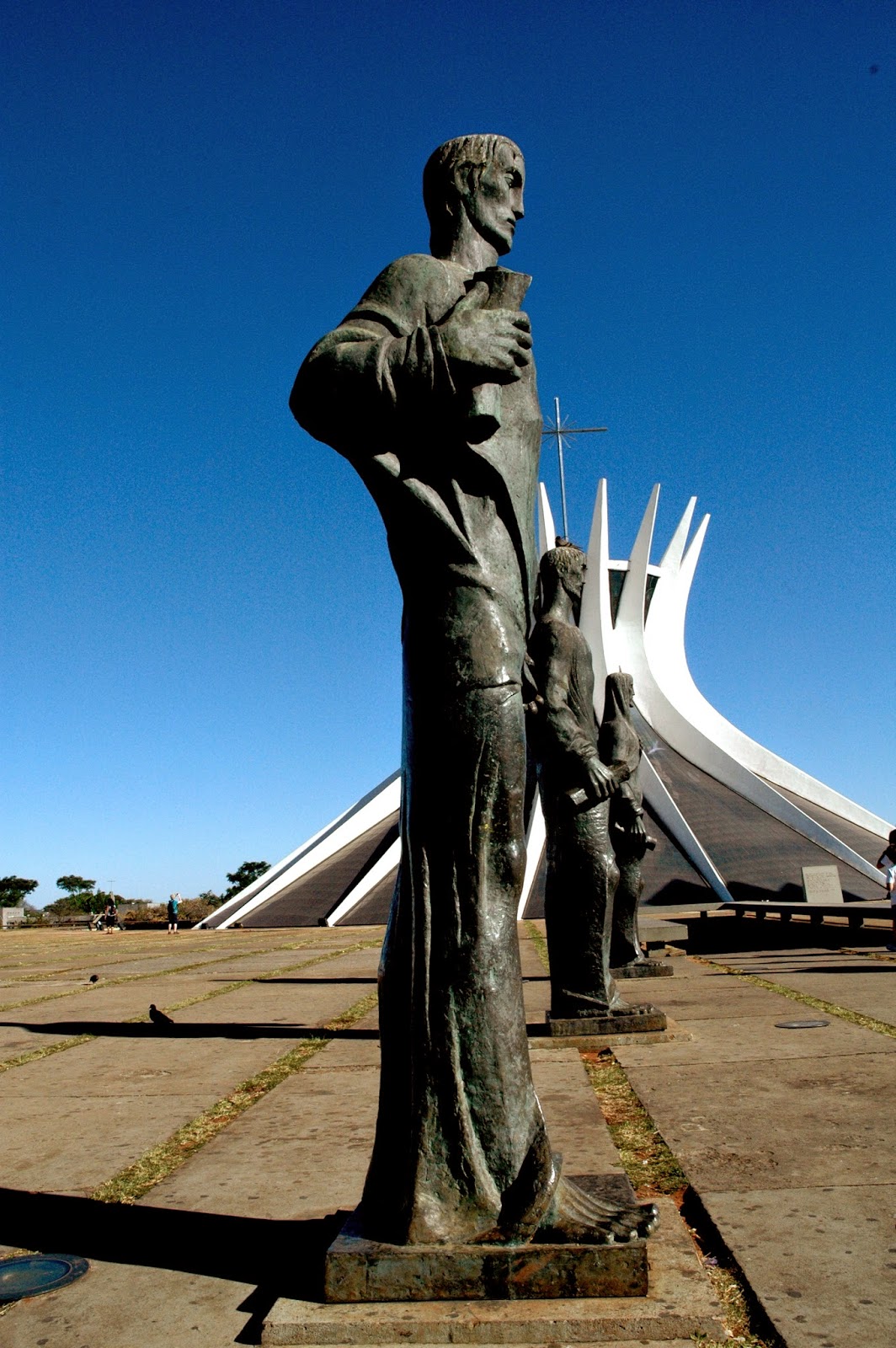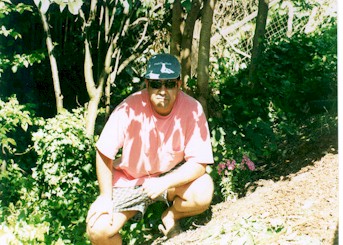Brasilia is bright and warm in winter, its "iconic" Niemeyer-designed Cathedral aspiring to the afternoon light, if not like the intended hands-raised-to-the-heavens-in-prayer, certainly like a crown of thorns. Kubitschek, the then President, had intended the structure as an "ecumenical cathedral" to be paid for by the State and open to all faiths, but successive governments failed to provide funding, and the building was eventually turned over to the Catholic Church to complete and own; the Pope donated the altar. In a triumph of form over function, the hyperbolic curves apparently have horrible acoustics, no one can hear the sermons.
We alight onto the dreamlike country of Fifazil. Coke-bottle maidens greet us at the foot of the jetway with free cans of sugar water; the local stadium shops have stopped taking cards other than Visa; Fuleco peeks out, pointing to giant screens showing rainbow-colored Brazilians doing Mexican waves, even as the polizei pull out the undesirable-looking out of line for questioning. After months of protests, welcome to the 2014 World Cup.
The protests started against the spending of billions of reais of public money on stadiums for the World Cup, and snowballed into something larger. On the 27th of May, 25,000 protesters gathered in central Brasilia; among them were large numbers of aboriginal Brazilians who went to the capital to protest against changes in laws regarding indigenous land. This one ended in a confrontation with the military police, where a cavalryman was struck by an arrow.
Since the Brazilian government signed a contract with FIFA in 2007, laws had been speedily approved to guarantee Fifa’s interests under the General Legislation of the World Cup. Fifa got a two-kilometer “exclusion zone” around 'their' (i.e. paid for by taxpayer money) stadia. Within these limits, Fifa controls the circulation of people, forbids the sale of products not licensed from Fifa, and bans any financial transaction not initiated by Fifa. (According to the NGO Streetnet, during the 2010 World Cup in South Africa 100,000 street vendors lost their income during the games under similar 'laws'). In Brazil wherever protesters tried to approach stadia, hundreds of police armed with “non-lethal” devices (made by the same Brazilian manufacturer, Condor, that supplies the Turkish police and the Emirates of the Gulf) shot and gassed them; later, the police admitted that they opened fire "to protect Fifa’s strict rules about crowd control."

Romario, the ex-Brazilian star, now member of the Parliament, dubbed the World Cup as the "biggest theft in history", and said the real cost would be over R$ 100 billion (US$ 45 billion.) The annual education budget of Brazil is US$ $37 billion. “Dilma (Roussef, the President), please call me ‘World Cup’ and invest in me. Signed, Education” said a poster. The problem as Fifa saw it was that Brazil had too much democracy. Fifa secretary general Jerome Valcke, a Frenchman convicted in 2004 in New York for contract-fraud (in favor of Visa and against Mastercard), said in a press conference in April, “Less democracy is sometimes better for organizing a World Cup.” He also said he expected fewer problems in Russia in 2018 under Putin. Sometime ago, a disgruntled Fifa exec leaked an email from Valcke which suggested that Qatar had bought the rights to host the 2022 FIFA World Cup. Valcke then issued a statement denying he had suggested it was bribery, saying instead that the country had "used its financial muscle to lobby for support." Qatar denied any impropriety.
The seven biggest construction companies in Brazil, all major campaign donors to Dilma's oligarchy in Brasilia, have benefited from an opaque pricing regime that allows them to increase the charges to the government in the event of delays in construction. Naturally the World Cup projects were over budget. The head of the Brazilian Football Confederation, Ricardo Teixeira, who "won" the 2014 World Cup to Brazil, now lives a tranquil retired life in a $ 7.4 million house (in Miami.)
In 2007, Dani Rodrik, a Turkish don of Princeton
proposed an "impossibility theorem" for the global economy - "that democracy, national sovereignty and global economic integration are mutually incompatible: we can combine any two of the three, but never have all three simultaneously and in full."
Rodrik's 'trilemma' says if we want to deepen both economic globalization and political democracy, we would require global institutions that are truly democratic and respond to legitimate demands, the very basic needs of world citizens — that is governance at a global level, which is at odds with the current reality of squabbling tribal-zero-sum but 'sovereign' nation states. He writes:
"... deep economic integration requires that we eliminate all transaction costs traders and financiers face in their cross-border dealings. Nation-states are a fundamental source of such transaction costs. They generate sovereign risk, create regulatory discontinuities at the border, prevent global regulation and supervision of financial intermediaries, and render a global lender of last resort a hopeless dream. The malfunctioning of the global financial system is intimately linked with these specific transaction costs.
So what do we do?
One option is to go for global federalism, where we align the scope of (democratic) politics with the scope of global markets. Realistically, though, this is something that cannot be done at a global scale. It is pretty difficult to achieve even among a relatively like-minded and similar countries, as the experience of the EU demonstrates.
Another option is maintain the nation state, but to make it responsive only to the needs of the international economy. This would be a state that would pursue global economic integration at the expense of other domestic objectives. The nineteenth century gold standard provides a historical example of this kind of a state. The collapse of the Argentine convertibility experiment of the 1990s provides a contemporary illustration of its inherent incompatibility with democracy.
Finally, we can downgrade our ambitions with respect to how much international economic integration we can (or should) achieve. So we go for a limited version of globalization, which is what the post-war Bretton Woods regime was about (with its capital controls and limited trade liberalization). It has unfortunately become a victim of its own success. We have forgotten the compromise embedded in that system, and which was the source of its success."
Contrary to popular expectation, governments have grown the largest in those economies that are the most exposed to international markets; Rodrik concludes that this is because in highly globalized nations, citizens demand that their governments compensate them against the risk that international economic forces expose them to. There is no better way to understand India’s position at the WTO negotiations on food security, or ordinary Brazilians threatening to engulf the World Cup in violent street-fights. In addition, what Rodrik misses is that "global economic integration" is not a clear-cut rule-based one as he theorizes; from the East India Company down to Enron, 'integration' is achieved by bribery, treachery, espionage, coercion and threat of militarized violence. The problem with capitalism, as it is said, is capitalists.
To also
recall Slavoj Žižek, the Slovenian philosopher:
Global capitalism is a complex process which affects different countries in different ways. What unites the protests, for all their multifariousness, is that they are all reactions against different facets of capitalist globalization. The general tendency of today’s global capitalism is towards further expansion of the market, creeping enclosure of public space, reduction of public services (healthcare, education, culture), and increasingly authoritarian political power. It is in this context that Greeks are protesting against the rule of international financial capital and their own corrupt and inefficient state, which is less and less able to provide basic social services. It is in this context too that Turks are protesting against the commercialization of public space and against religious authoritarianism; that Egyptians are protesting against a regime supported by the Western powers; that Iranians are protesting against corruption and religious fundamentalism, and so on. None of these protests can be reduced to a single issue. They all deal with a specific combination of at least two issues, one economic (from corruption to inefficiency to capitalism itself), the other politico-ideological (from the demand for democracy to the demand that conventional multi-party democracy be overthrown). The same holds for the Occupy movement. Beneath the profusion of (often confused) statements, the movement had two basic features: first, discontent with capitalism as a system, not just with its particular local corruptions; second, an awareness that the institutionalized form of representative multi-party democracy is not equipped to fight capitalist excess, i.e. democracy has to be reinvented.
Just because the underlying cause of the protests is global capitalism, that doesn’t mean the only solution is directly to overthrow it. Nor is it viable to pursue the pragmatic alternative, which is to deal with individual problems and wait for a radical transformation. That ignores the fact that global capitalism is necessarily inconsistent: market freedom goes hand in hand with US support for its own farmers; preaching democracy goes hand in hand with supporting Saudi Arabia. This inconsistency opens up a space for political intervention: wherever the global capitalist system is forced to violate its own rules, there is an opportunity to insist that it follow those rules. To demand consistency at strategically selected points where the system cannot afford to be consistent is to put pressure on the entire system. The art of politics lies in making particular demands which, while thoroughly realistic, strike at the core of hegemonic ideology and imply much more radical change. Such demands, while feasible and legitimate, are de facto impossible. Obama’s proposal for universal healthcare was such a case, which is why reactions to it were so violent.

We gather in a beer-and-soda pit stop in Guara, an industrial suburb of Brasilia, as the Brazil-Colombia match gets underway. Stackers from nearby warehouses, waitresses at the end of their shifts, gas station attendants - everyone effusively makes space for our little group. One of the problems to the Marxist's "99-percenters of the world unite" is the obduracy of the nation state. Once the ball starts rolling, the 99-percenter Brazilians close ranks with their 1-percenters, and against the 99-percenters of Colombia, honking vuvuzelas and baiting their neighbors to the north with the choicest of epithets.
(This was the match wherein the Brazilian star Neymar sustained a lumbar vertebra fracture when he was kneed in the back by the Colombian defender Juan Camilo Zúñiga, though it is not apparent to any of the viewers at the time that the injury is serious.
The NYT wrote the Brazilians had played a bellicose game; others
disagreed. To me it did look like the referee had lost control early, in his attempts to make sure Brazil did not choke and ruin the tournament for Fifa; and that the unanticipated outcome of this was a tackle that contributed to the Seleção losing 7-1 in their very next outing.)








